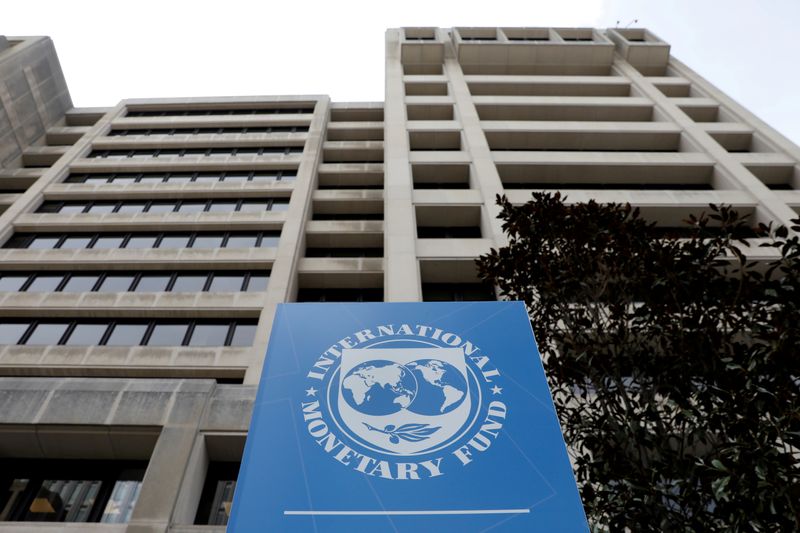By David Lawder and Andrea Shalal
WASHINGTON (Reuters) - U.S. opposition is expected to prevent the International Monetary Fund this week from deploying one of its most powerful tools to help countries fight the coronavirus: creating a new allocation of Special Drawing Rights.
The move, akin to a central bank "printing" new money, has been advocated by economists, finance ministers and non-profit groups to provide as much as $500 billion in urgently-needed liquidity for the IMF's 189 member countries.
SDRs
The IMF last approved a $250-billion new allocation of SDRs in 2009, during the last financial crisis, boosting liquidity for cash-strapped countries.
Doing so again now could provide more flexibility to the 100 countries that have already sought IMF emergency loans and grants, and allow new lending to countries with "unsustainable" debt burdens, such as Argentina.
An SDR expansion has attracted some celebrity advocates, such as investor George Soros and U2 lead singer Bono's ONE anti-poverty organization, along with trade unions and faith-based groups.
Finance officials will debate the issue during this week's virtual IMF and World Bank Spring Meetings, but multiple sources familiar with the Fund's deliberations say the United States, the IMF's dominant shareholder, actively opposes such a move.
The Trump administration opposes providing countries such as Iran and China with billions of dollars in new resources with no conditions, two of the sources said.
The opposition comes at a time when U.S. tension with China is running high over the causes of the virus and a long-running trade war. U.S.-Iran tension nearly boiled over into armed conflict in January.
The U.S. Treasury Department would prefer to see the IMF focus on using its $1 trillion in existing resources, including $100 billion in emergency loans and grants, to aid countries' health responses to the crisis, the sources said.
IMF Managing Director Kristalina Georgieva first raised the prospect of an SDR allocation last month, but was quickly rebuffed by U.S. officials, who hold an effective veto over major IMF decisions.
"There hasn't been interest in pursuing SDRs from the U.S. side, in fact they went that far to say that they are not favoring SDRs," she said on Friday in a podcast https://www.economist.com/podcasts/2020/04/09/can-the-imf-bail-out-the-global-economy produced by the Economist magazine.
LENDING SDRs
Georgieva said the United States wanted the IMF to use all available tools and she did not expect Washington to block countries from "donating" existing SDRs to supplement IMF lending facilities for poor countries.
Such a deal to "lend" existing SDRs is more likely this week, the sources familiar with the Fund's deliberations said.
A U.S. Treasury spokeswoman declined to comment specifically on the SDR allocations, but said the agency supported a variety of efforts at the IMF to provide rapid, targeted assistance to countries in need.
"We support accelerating IMF procedures, higher access from the IMF’s emergency lending facilities, and support from donors for the IMF’s assistance to low income countries, including grants to help these countries make debt payments to the IMF," the spokeswoman said in an emailed statement.
On Tuesday, the IMF said the recession sparked by the virus would be far deeper than the Great Recession of 2008 and 2009, shrinking the global economy by 3.0% in 2020.
CELEBRITY ADVOCATES
French Finance Minister Bruno Le Maire argued in favor of a new SDR allocation of about $500 billion, saying in a statement to the IMF's steering committee it would provide an extra $16 billion to low-income nations.
"It was a success in 2009 to provide liquidity and it would send a strong signal to markets," Le Maire said.
Columbia University professor Joseph Stiglitz, a former World Bank chief economist, said new SDRs would not cost U.S. taxpayers anything.
"And if we can help emerging markets and developing countries, it will rebound to us in terms of health and in terms of the economic recovery," he said.
IMF officials, while acknowledging that a deal for a new SDR allocation is unlikely this week, are taking a patient approach, hoping to eventually persuade U.S. Treasury officials of the merits of the move.
"Nothing is off the table," IMF chief economist Gita Gopinath told Reuters on Tuesday.
